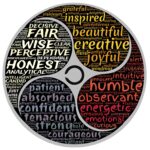In my last post, I described the essential role that values play in the life you lead. I also showed how you can deconstruct values so you can really understand what values are driving your life.
But it is one thing to recognize what values you possess and to admit that some (or all) of them may not bring you the meaning, fulfillment, and happiness you had hoped for in your life. It is an entirely different thing to understand what values will actually bring you the life you want. This process is one of reconstruction of your values so that your values act as the basis for that “ideal life” in the future.
Reconstructing Your Values
There are several questions you can ask yourself to help you figure out what values will make you happy. First, what do you choose to do in your life? Assuming that you choose activities in your life freely, such as cultural, spiritual, or athletic activities, specifying these activities is a first step in identifying the values that create congruence between your values and your life. Second, what activities do you have a great passion for and that bring you true joy in your participation? There is no better clue to what you deeply value than activities such as these. Third, what activities, experiences, and people cause you to feel deeply engaged and connected with? This absorption can only occur when your values and life are one.
Having answered these questions, you can now dig beneath the surface of those activities, experiences, and people, and identify the values that underlie them. One client, Wendy, a financial analyst, had enjoyed the visual arts since childhood, but her parents had discouraged her from pursuing them because “they wouldn’t pay the bills.” When I asked Wendy to answer the above questions, she realized that her love of the arts was the only thing in her life that she felt a deep connection with. Through careful consideration of her values, Wendy discovered that the inspiration of creation and the physical expression of her creativity were fundamental values that she was never able to express in her career. With this insight—this epiphany!, as she put it—Wendy was able to more actively pursue this passion with greater clarity and purpose, and, for the first time in her life, felt greater alignment between her values and her life, and found a greater sense of balance and contentment.
An important part of this reconstruction process is to reframe success in a way that is consistent with your true values. Success for those whose values and lives are out of synch with each other often have bought into the definitions of success imposed by popular culture, for example, wealth, status, popularity, and physical appearance. In contrast, those who are able to align their values with their lives create their own definitions of success, such as living a life true to their values, setting and achieving meaningful goals, or making the world a better place.
Living Your Values
You may be thinking, “This whole reconstruction thing seems pretty easy.” Yes, recognizing the values you were raised with and coming to understand the values that make you happy is the easy part. The real challenge is learning to embrace your true values and create a life that is in synch with them. Your life to the present, though perhaps causing you dissatisfaction and unhappiness, is nonetheless familiar, predictable, and, in a perverse sort of way, comfortable. You have lived this way for many years and your life habits are deeply ingrained.
Living your life in accordance with your newly identified or clarified values means discarding values, beliefs, and ways of life that have been a part of you for your entire life. However unhappy you may feel now, the prospect of change and the uncertainty and instability that accompanies it can be intimidating, if not downright terrifying.
At some point though, you must tell yourself that your life as it is now is no longer acceptable. You just need to decide that enough is enough and that it is time for a change. Once you make that commit, learning to live your new values will be easier because you will have, at that moment, exerted a new force on your life and begun the process of changing its course. It will also be easier because living your values will be self-rewarding; participating in activities and experiences, and being with people that are consistent with your new values will bring you freedom, balance, and happiness.
Once you make this decision to alter your life, you need to decide how much of a change you want to make. A part of you would probably like to throw your entire life away and start fresh, perhaps on a tropical island in the South Pacific or in a mountain cabin inIdaho. But living your newly realized values does not necessarily mean discarding your old life and beginning life anew. The reality is that few people can dramatically alter their basic life. Few people can afford to quit their jobs and become starving artists or some such equivalent. But that does not mean that you can’t make meaningful change in your life that will allow you to align your values and life and find happiness.
Instead, living your values means placing greater emphasis on and making a greater commitment to activities, experiences, and people that express those values. It also involves creating balance in your life. For years, your “life scale” may have been weighted heavily toward the unhealthy values that you adopted from your parents and popular culture. This imbalance may have enabled you achieve success, but at the steep cost of little happiness. Living your values means reducing the weight of the unhealthy values and placing greater weight on the side of the scale that holds your new values. By doing so, you place more emphasis on activities, experiences, and people that that you truly value and that bring you happiness.
A former client of mine, Andy, has always had a fascination with physics. As a child and teenager, he would read about the great physicists and explore the theories of physics. But Andy’s father discouraged him from pursuing the study of physics by saying that the only way to make a decent living as a physicist was to be Stephen Hawking.
In college, Andy majored in business while wishing he could study to become a high school physics teacher. In the ensuing 20 years, Andy became a successful businessman and, not surprisingly, a rather discontented fellow. Recently, I shared with him my views about aligning values and life in pursuit of happiness. I asked him to answer those three questions above. Andy realized that what he loved most about physics was the challenge of understanding the theories and making them comprehensible to others. He also recognized that he has always wanted to help young people, but, up to the present, had only done so by donating money to educational programs.
Andy knew it was time for a change in his life. At the same time, he realized that he couldn’t just quit his job and become a high school physics teacher. Andy had a family to support and a somewhat lavish lifestyle that he enjoyed—the proverbial “golden handcuffs.” So, he found a way to balance his family and career with activities that were in synch his newly realized values. Andy enrolled in a physics class in the adult-learning program of a nearby university. He also volunteered to tutor high school students once night a week. Finally, he signed up for a one-week stint as a counselor at a summer science camp. I saw Andy recently. I have never seen him so happy and at peace!





